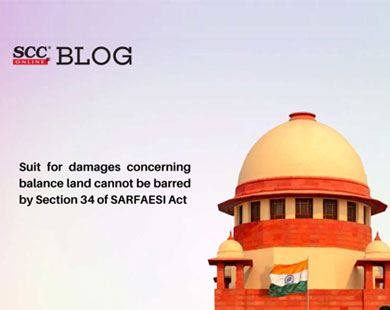Supreme Court: In an appeal against the judgment passed by the Kerala High Court, wherein it has set aside the judgment passed by the Trial Court directing the Bank to pay the plaintiff a sum of Rs.58,10,000 with interest at the rate of 12% per annum from the date of suit till realisation, the division bench of M.R Shah* and Krishna Murari, JJ while setting aside impugned judgment passed by the High Court directed the Bank to pay the decretal amount to the appellant with interest as per the judgment and decree passed by the Trial Court within a period of 8 weeks from the date of this judgment.
The Court noted that after the Bank received the possession of the secured property in exercise of powers under the Securitisation and Reconstruction of Financial Assets and Enforcement of Security Interest Act, 2002 (‘SARFAESI Act'), the property in question was put to auction, by an auction notice. The plaintiff on the basis of the representation made and the auction notice in which the land was put to auction was stated to be 54 cents submitted her offer of Rs.32,05,000/ for sale of 54 cents.
The Court noted that in the quotation itself the plaintiff specifically stated that the offer of Rs.32,05,000/ is subject to the condition that the absolute ownership and vacant possession of full extent of property without encumbrances is handed over. However, the Bank replied that as in the invitation to the public for tenders, it is stated that the property would be sold on “as is where is” and “as is what is” condition, the plaintiff may confirm that the plaintiff is ready to offer the bid and take the property in the present condition. However, immediately the plaintiff communicated that she is ready to purchase the property only if, absolute ownership, vacant possession and full enjoyment of 54 cents of land, free from all encumbrances is given, otherwise, she is not ready to purchase the property.
The Court further noted that the suit was for damages with respect to the balance land, which could not have been decided by the Debt Recovery Tribunal (‘DRT') or Appellate Tribunal, and Section 34 of the SARFAESI Act shall be applicable only in a case where the DRT and/or Appellate Tribunal is empowered to decide the matter under the SARFAESI Act. Further, the plaintiff did not challenge the sale or the sale certificate and just claimed damages with respect to the less area. Therefore, the High Court has seriously erred in holding that the suit was barred by Section 34 of the SARFAESI Act.
The Court noted that from the beginning the plaintiff insisted on handing over the possession of the 54 cents. Further, when the property was put to auction even the Bank was not aware of the actual measurement and had gone by the document and 54 cents was put to auction; the sale certificate was issued for 54 cents and even the sale certificate which was registered in the year 2012 was for 54 cents. Thus, it was not open for the financial institute like Bank to contend that though the Bank had handed over the possession of 34.60 cents, still the sale consideration recovered would be for 54 cents.
It was also noted that when the Tehsildar submitted the report, the Bank was aware that the actual area is 34.60 cents and not 54 cents. Thereafter, the Bank should be fair and not have issued the sale certificate for 54 cents.
The Court, while referring to Rule 8 of the 2002 SARFAESI Rules, said that as per this Rule, before effecting sale of the immovable property the authorised officer shall obtain valuation of the property from an approved valuer and fix the reserve price of the property and may sell the whole or any part of such immovable secured asset. Further, as per Section 54 of the Transfer of Property Act the seller was bound to disclose to any buyer any material defect in the property of which the buyer is not aware and which the buyer could not ordinarily discover.
Thus, it was held that the High Court has committed an error in allowing the appeal and quashing and setting aside the judgment and decree passed by the Trial Court.
[Leelamma Mathew v. Indian Overseas Bank, 2022 SCC OnLine SC 1601, decided on 17-11-2022]
*Judgment by: Justice M.R Shah
*Apoorva Goel, Editorial Assistant has reported this brief.






